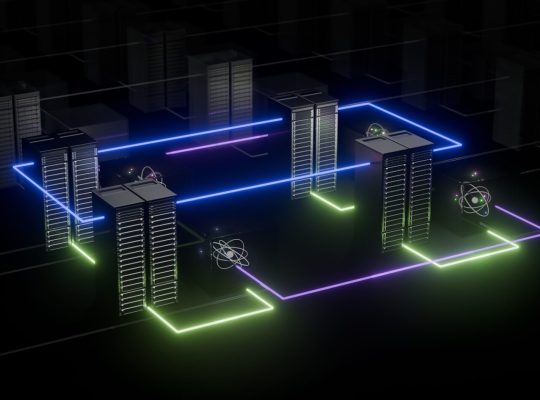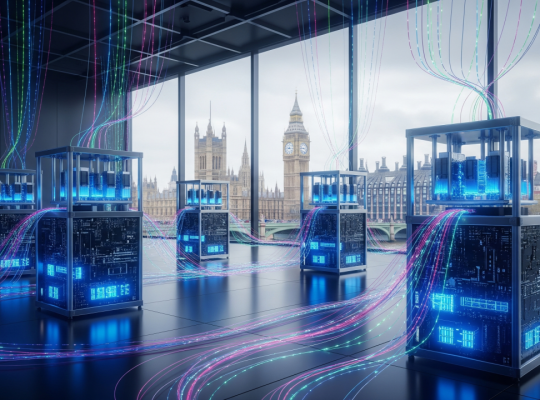Nvidia’s quantum research is not about building its own quantum computers, but rather aboutaccelerating the development and practical application of quantum computing by leveraging its expertise in AI, high-performance computing (HPC), and GPU technology. This focus has a profound impact on AI development in several key ways:
1. Enabling “Accelerated Quantum Supercomputing” for AI:
Hybrid Quantum-Classical Systems: Nvidia’s core strategy is centered around “accelerated quantum supercomputing,” which means tightly integrating quantum processing units (QPUs) with powerful classical AI supercomputers (like its DGX systems). This hybrid approach is crucial because current quantum computers are still prone to errors and limited in scale (NISQ era – Noisy Intermediate-Scale Quantum).
NVIDIA DGX Quantum: This specialized system, co-developed with Quantum Machines, directly integrates quantum control hardware with Nvidia’s Grace Hopper (GH) servers. This low-latency connection (under 4 microseconds round-trip) is vital for:
- Real-time Quantum Error Correction (QEC): Errors are a major challenge in quantum computing. AI, running on Nvidia’s GPUs, can analyze qubit states, identify errors, and apply corrections in real-time, making quantum computations more reliable. Nvidia’s research includes using transformer-based AI decoders for QEC.
- AI-driven Calibration: Quantum systems are extremely sensitive. AI can automate and optimize the complex calibration routines needed to keep qubits stable and performing optimally, simplifying operations and reducing costs.
- Hybrid Algorithms: Many promising quantum algorithms are “hybrid,” meaning they combine quantum and classical computations. Nvidia’s platform facilitates the development and execution of these algorithms, where GPUs handle the computationally intensive classical parts and QPUs handle the quantum subroutines.
2. Speeding Up Quantum Machine Learning (QML):
- Enhanced Optimization: Many AI problems, especially in machine learning, are optimization problems (e.g., training neural networks, hyperparameter tuning). Quantum algorithms like Quantum Approximate Optimization Algorithm (QAOA) and Variational Quantum Eigensolver (VQE) could find optimal solutions much faster than classical methods. Nvidia’s research supports running these on hybrid systems.
- Faster Data Processing: Quantum machine learning algorithms have the potential to process and classify vast datasets more efficiently, which is critical for complex AI tasks.
- Quantum Neural Networks: Nvidia is exploring the development of quantum neural networks and hybrid quantum neural networks, which could fundamentally change how AI models learn and process information, potentially expanding cognitive frontiers.
- Addressing Data Scarcity: Quantum machine learning might be able to train AI models with exponentially fewer examples, which is highly beneficial for data-scarce domains like drug discovery or materials science.
3. Providing Essential Tools and Software:
CUDA-Q Platform: This is Nvidia’s open-source, QPU-agnostic platform for accelerated quantum supercomputing. It allows researchers to:
- Develop hybrid quantum-classical code: Programmers can write code once and deploy it on various QPUs (from partners like IonQ, Quantinuum, QuEra, Anyon Systems, etc.) or GPU-accelerated simulators.
- Leverage GPU Acceleration: CUDA-Q can significantly speed up quantum algorithm simulations on GPUs (e.g., up to 2500x speedups over CPU for large-scale simulations), enabling researchers to test and iterate on algorithms more rapidly.
- Interoperate with AI and HPC Workflows: CUDA-Q is designed to integrate seamlessly with existing AI and HPC tools and frameworks, making quantum computing more accessible to a broader range of researchers and developers.
cuQuantum SDK: Introduced earlier, cuQuantum is designed to speed up quantum circuit simulation frameworks, allowing researchers to explore and validate quantum algorithms more efficiently on classical GPUs.
4. Advancing Scientific Discovery with AI at the Core:
Drug Discovery and Materials Science: Quantum computing’s ability to accurately simulate molecular interactions could revolutionize drug discovery, leading to faster development of new medications. Nvidia’s collaborations (e.g., with Moderna on biomolecule binding affinity prediction) are directly applying quantum-accelerated AI to these fields.
Climate Modeling: Complex simulations for climate and weather prediction could be dramatically enhanced by quantum capabilities, leading to more accurate models.
Logistics and Supply Chain Optimization: AI-powered optimization, enhanced by quantum algorithms, could revolutionize complex logistics and supply chain challenges.
Quantum Chemistry Workflows: Nvidia is collaborating with partners like Amazon and AstraZeneca to build end-to-end accelerated quantum chemistry workflows using CUDA-Q, demonstrating real-world applications.
5. Building a Collaborative Ecosystem:
NVIDIA Accelerated Quantum Research Center (NVAQC): Located in Boston, this center is a hub for integrating quantum hardware with AI supercomputers. It fosters collaboration with leading quantum hardware companies, academic institutions (like Harvard and MIT), and industry partners to solve the most challenging problems in quantum computing, from qubit noise to practical device deployment.
Partnerships with Academia and Industry: Nvidia actively partners with a wide array of quantum hardware providers, software companies, and supercomputing centers to integrate CUDA-Q into their platforms and accelerate joint research projects.
Challenges and the Path Forward:
While Nvidia’s quantum research holds immense promise for AI, it’s important to acknowledge the challenges:
Qubit Stability and Error Correction: Despite advancements, maintaining qubit coherence and performing effective error correction remains a significant hurdle for building large-scale, fault-tolerant quantum computers. Nvidia’s AI-driven QEC research is crucial here.
Scalability: Scaling up quantum systems while maintaining performance is a major technical challenge.
Algorithm Development: Developing quantum algorithms that can genuinely outperform classical algorithms for real-world AI problems is an ongoing area of research.
Hardware Limitations: Current quantum devices still have high error rates and limited qubit coherence times, making them unsuitable for massive, complex AI tasks. Hybrid approaches are the bridge to the future.
In essence, Nvidia is not simply observing the quantum computing space; it’s actively shaping its intersection with AI. By providing powerful classical acceleration, robust software tools, and fostering a collaborative research environment, Nvidia aims to be at the forefront of enabling useful, large-scale quantum computers that will ultimately unlock unprecedented capabilities for artificial intelligence.













